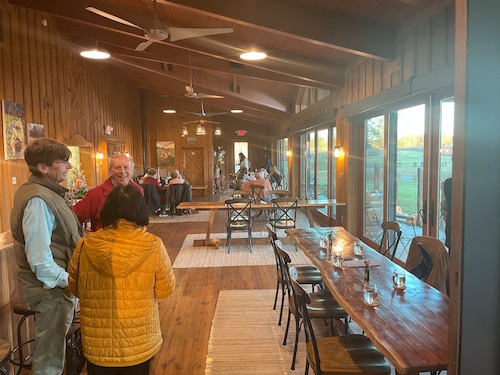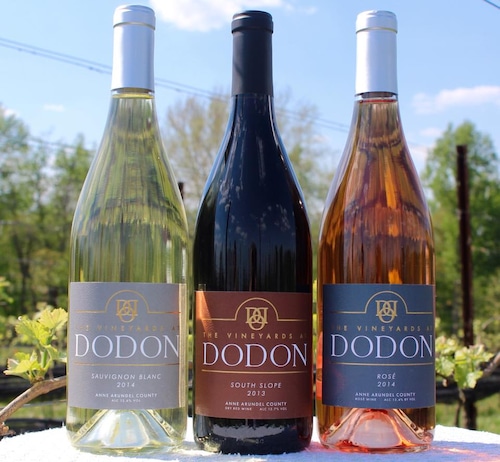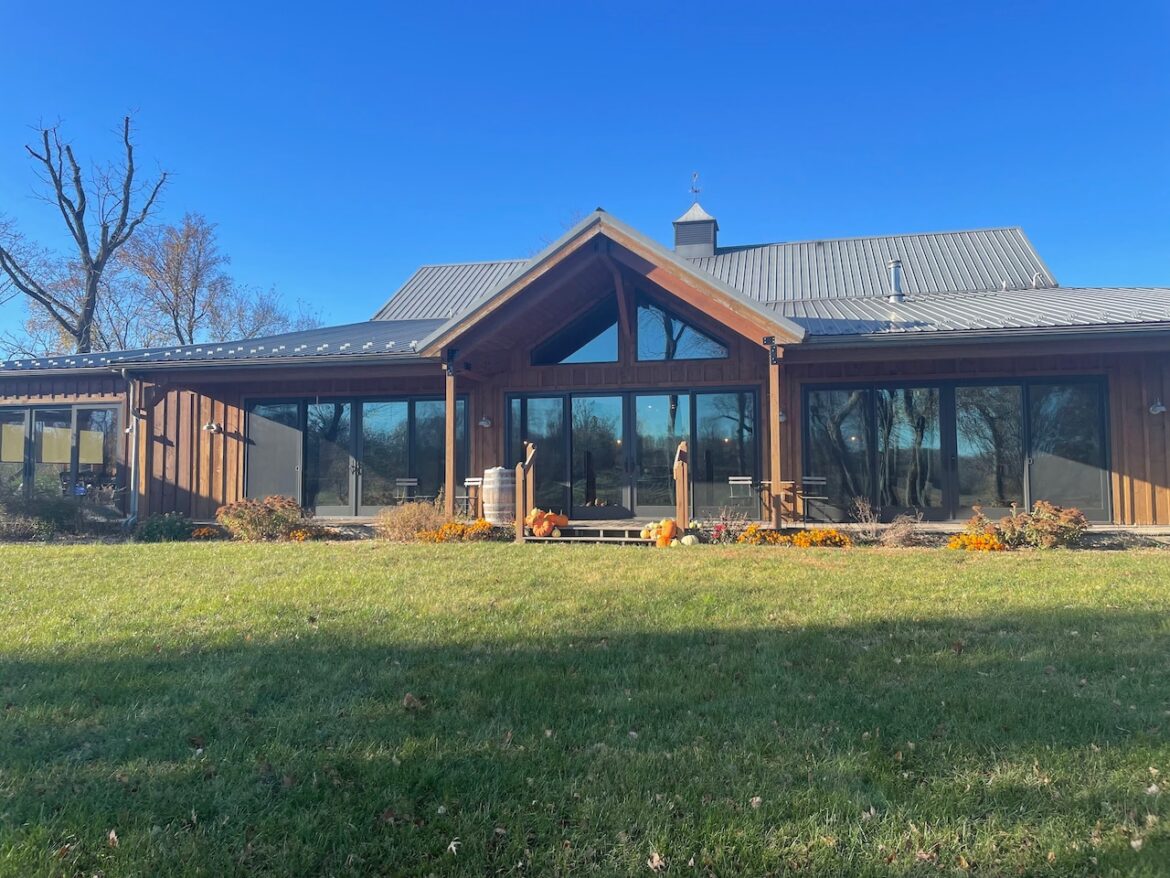The Vineyards at Dodon is a winery in Davidsonville, Maryland.
But what Tom Croghan and wife Polly Pittman have evolved on the farm in central Anne Arundel County goes well beyond filling bottles with some of the best wines produced in the mid-Atlantic.
From the more than 31,000 vines densely planted over 17 acres in three adjacent vineyards, to the Living Vineyards Project they have undertaken, to the op/eds on farming and agriculture that you can access at the Blog tab on the website, they have built a sustainability game plan for the present and the future.
As they note atop the Farming tab on his website: “Agriculture is at a crossroads. We can continue to degrade the environment. Or we can restore it. At Dodon, we’ve chosen the latter.”
Per the website, Croghan was raised on a small farm in north central West Virginia and “grew to appreciate the rhythms of nature, the joy of hard work, and the importance of place. He brings these early lessons, as well as those from a successful career in medicine, immunology and business, to create wines that reflect the unique soil and the site.”
They’ll get a chance to help share some of that knowledge and farming philosophy, partnering with Kelly Melville and the Paicines Ranch Learning Center in California for an intensive one-and-a-half-day workshop on regenerative viticulture. During this field and classroom-based opportunity, attendees will learn the tools of ecological viticulture, the science that supports them, how they can be applied in diverse settings, and their benefits for the environment and the wine. The program is designed for winegrape growers, wine producers, wine merchants, vineyard managers, agroforesters, students, educators, and anyone passionate about healthy ecosystems.
It’s planned for Sunday and Monday, June 16-17.
Full-price registration for the workshop is $299, which includes four meals (light breakfast, lunch, and dinner on Day 1, and a light breakfast on Day 2). The second day will wrap up with a happy hour and dinner featuring lamb from Dodon’s vineyard and locally grown vegetables. Growers are invited to bring a bottle to share with the group.

The tasting room at Dodon, where visitors can pair their wines with Dodon’s curated snack menu. It is open for reservations year-round.Paul Vigna
Register by May 15 to save $50, and scholarships might become available. Click on this link if you want to receive scholarship updates.
More information on the workshop and a spot to register can be found at this link.
Croghan and Pittman are Dodon’s co-owners, and the team includes General Manager Regina McCarthy, vineyard manager Roberto Gomez and winemakers Kurtis Flaherty and consultant Steve Blais.
The Vineyards at Dodon is open on Fridays, Saturdays and Sundays, year-round, to both members of The Dodon Wine Club and the general public. Reservations are required. Several types of tastings are available.
In addition to warmer-weather seating outdoors and on the hillside in addition to under a pavilion, there’s an indoor area that’s reserved for guests who are 21 and older and who wish to purchase food from Dodon’s curated snack menu. That room is available rain or shine.
Wine can be purchased by the bottle, glass, and flight.
Details on visiting can be found at this link, and a list of the wines and what they cost are at this link.
In 2024, Wine Enthusiast magazine announced that The Vineyards at Dodon was among five nominees for its American Winery of the Year Award, particularly satisfying as the only producers outside of California to be included on the list. The award recognizes wineries that consistently produce high-quality wines, demonstrate leadership in sustainability, and create innovative tasting experiences, among other criteria.
Dodon is the largest working family farm in Anne Arundel County, featuring more than 555 acres that break down this way: approximately 400 acres of natural forest and 6 miles of riparian buffers, 120 acres of pasture and hay production, 17 acres of vineyard, and 19 acres of farmstead. There are also small parcels devoted to tree fruits, vegetables, and non-timber forest products.
The farm is currently home to four generations of the Pittman family. The Vineyards at Dodon is owned solely by Pittman and Croghan, and as much as they can point out the successes they’ve had in creating what’s there now, just as important is the work that lies ahead.
Some of their thoughts were covered in the lengthy assessment of the 2024 vintage on their website that segues into what comes next.
In part, the post read:
The magnitude of the challenges ahead of us is daunting. The possibility of the food system collapsing is increasing, yet our political leaders have failed to act. Experts proposed a national food policy a decade ago. In 2019, the Eat Lancet Commission created a “planetary health” diet to reduce greenhouse gas emissions and improve health. Still, we have yet to produce a national or state food policy or to incorporate climate change into our national dietary guidelines.
Without political leadership, businesses and individuals are trying to implement the necessary changes. Doing so will be more complex and challenging than it should be without public leadership. Only the government can coordinate and finance an effort of this size and ensure the benefits and costs are equitably distributed. But, as Paul Hawken writes in The Ecology of Commerce, “The promise of business is to increase the well-being of humankind through service, creative invention, and ethical action.” We must still do our part.

Three shades of The Vineyards of Dodon, from left: Its Sauvignon Blanc, South Slope red blend, and rose.The Vineyards at Dodon
At the Vineyard, the “triple aim” approach I proposed two years ago has served us well as a roadmap. Over the past decade, we’ve used the planetary boundaries framework to enhance biodiversity, reduce eutrophication and pollution, and remove carbon dioxide from the environment. We’ve been transparent when reporting our successes and failures.
In this context, we have begun to plan new farming operations to create a sustainable food source. While still in the early phase of the new project, which I call the ”Do Your Part Initiative,” here are five key components of the vision that Polly and I have developed:
Converting the tree plantings to the north and east of the East Vineyard to a silvopasture that combines the benefits of trees and hedgerows with grazing.Adapting the current grazing areas to silvopasture by planting 350 apple trees will also allow cider production.Adding a “potager” or chef’s garden in the bowl between the winery and the South Vineyard will create what we hope will become a beautiful entrance to the winery that produces food.Developing a “food forest” garden west of the Sauvignon Blanc blocks (West Vineyard), including picnic areas for our Wine Club Members.Establishing a nonprofit “Learning Center” to provide apprenticeships for beginning farmers, bring together established fruit and vegetable producers to create new markets, and educate the public and policymakers about agroecology.
The post concluded: We would welcome your input as we continue to shape plans. We are most excited about crafting a vision of what a just, ecological society could look like. It’s doing our part.

